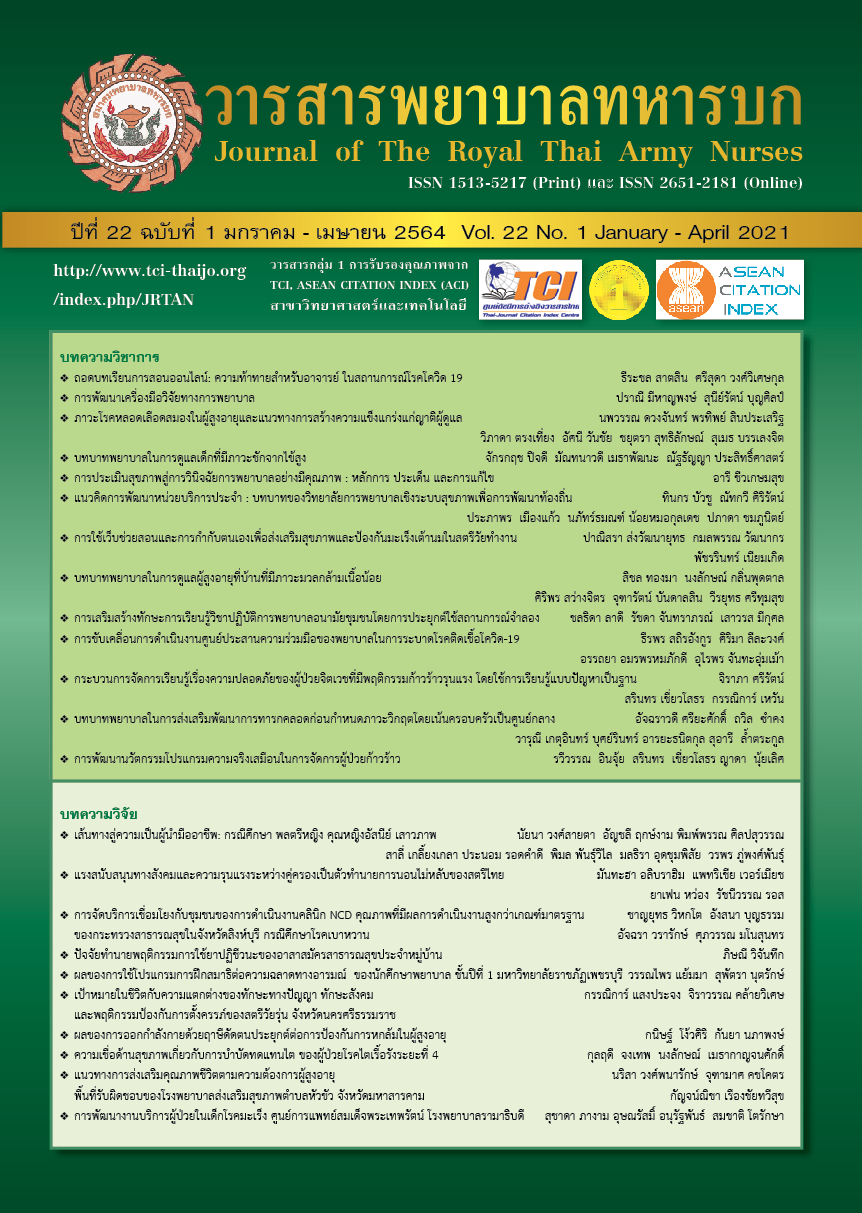Social Support and Intimate Partner Violence as Predictors of Insomnia among Thai Women
Keywords:
Insomnia, intimate partner violence, physical violence, sexual violence, psychological violence, social supportAbstract
Exposure to extreme stressors such as intimate partner violence (IPV) could lead to insomnia, affecting physical and mental health of the victims. This study aimed to examine a) the relationships between insomnia and the number of types of IPV, perceived severity of violence, and social support among Thai adult women; b) the moderating effect of social support on the relationships between the number of types of IPV, perceived severity of each type of IPV (physical violence, sexual, and psychological) and insomnia after controlling for age, education, and income; and c) which form of social support, family or friends, was more effective as a moderator. The transactional model of stress and coping guided the study. A correlational, cross-sectional design with secondary data analysis was used. The insomnia item of the Patient Health Questionnaire, Severity of Abuse against Women Scale, and Multidimensional Scale of Perceived Social Support (family scale, and family scale) were used to measure insomnia, the number of types of IPV, and social support, respectively. The study sample was 284 Thai women receiving care at obstetrics and gynecology units in a Thai hospital. Hierarchical multiple regression was used to analyze data. Results showed that friends support and the number of types of IPV experienced significantly predicted insomnia.
Downloads
References
Chattu VK, Manzar D, Kumary S, Burman D, Spence DW, Pandi-Perumal SR. The global problem of insufficient sleep and its serious public health implications. Healthcare. 2019; 7: 1-16.
Foster RG. Sleep, circadian rhythms and health. Interface focus. 2020;10(3):20190098.
Walker R, Shannon L, Logan T. Sleep loss and partner violence victimization. Journal of Interpersonal Violence. 2011; 26: 2004-2024.
Grønli J, Melinder A, Ousdal OT, Pallesen S, Endestad T, Milde AM. Life threat and sleep disturbances in adolescents: A two-year follow-up of survivors from the 2011 Utøya, Norway, terror attack. Journal of Traumatic Stress. 2017; 30: 219-228.
Munjavong M, Limpawattana P, Mairiang P, Anutrakulchai S. Prevalence of insomnia and related impact. International Journal of Psychiatry Medicine. 2016; 51: 544-553.
Assantachai P, Aekplakorn W, Pattara-Archachai J, Porapakkham Y. Factors associated with insomnia in older people with a mild to moderate degree of poor cognitive ability in Thailand. Geriatrics & Gerontology International. 2011; 11: 16-23.
Montakarn CH, Usaneya P. Intimate partner violence: Thailand situation and intervention programme. International Journal of Social Science and Humanity. 2014; 4: 275-278.
Young-Wolff KC, Hellmuth J, Jaquier V, Swan SC, Connell C, Sullivan TP. Patterns of resource utilization and mental health symptoms among women exposed to multiple types of victimization: A latent class analysis. Journal of Interpersonal Violence. 2013; 28: 3059–3083.
Ross R, Stidham A, Saenyakul P, Creswell J. Intimate partner violence, emotional support and health outcomes among Thai women: Mixed methods study. Journal of the Royal Thai Army Nurses. 2015; 16: 22-32. (in Thai)
Chuemchit M, Chernkwanma S, Rugkua R, Daengthern L, Abdullakasim P, Wieringa S. Prevalence of intimate partner violence in Thailand. Journal of Family Violence. 2018; 33: 315-323.
Pow JL. The impact of daily occupational stress on sleep among shift workers: social support as a buffer (thesis). Vancouver, Canada: University of British Columbia; 2015.
Kamimura A, Ganta V, Myers K, Thomas T. Intimate partner violence, childhood abuse, and in-law abuse among women utilizing community health services in Gujarat, India. Journal of Interpersonal Violence. 2017;32: 3778-3796.
Wright E. The relationship between social support and intimate partner violence in neighborhood context. Crime & Delinquency. 2015; 61: 1333-1359.
Lazarus RS, Folkman S. Stress, appraisal and coping. New York: Springer; 1984.
Van Voorhis LM. Morgan CR. (2007). Understanding power and rules of thumb for determining sample sizes. Tutorials in Quantitative Methods for Psychology. 2007; 3: 43-50.
Kroenke K, Spitzer RL, Williams J B. The PHQ-15: Validity of a new measure for evaluating the severity of somatic symptoms. Psychosomatic Medicine. 2002; 64: 258-266.
Marshall LL. The severity of violence against men scale. Journal Family Violence. 1992; 7: 189-203.
Tolman RM. The development of a measure of psychological maltreatment of women by their male partners. Violence and Victims. 1989; 4: 173-189.
Zimet GD, Dahlem NW, Zimet SG, Farley GK. The multidimensional scale of perceived social support. Journal of Personality Assessment. 1988; 52: 30-41.
Eck, D. Bootstrapping for multivariate linear regression models. Statistics & Probability Letters. 2017; 134: 1-13.
Pigeon WR, Cerulli C, Richards H, He H, Perlis M, Caine E. Sleep disturbances and their association with mental health among women exposed to intimate partner violence. Journal of Women’s Health. 2011; 20: 1923-1929.
Toussaint-Green G. Attitudes of Dominicans towards intimate partner violence against women. (dissertation). Chicago, IL: The Chicago School of Professional Psychology; 2016.
Jarrin DC, Chen IY, Ivers H, Morin CM. The role of vulnerability in stress-related insomnia, social support and coping styles on incidence and persistence of insomnia. Journal of Sleep Research. 2014; 23: 681–688.
Van Schalkwijk FJ, Blessinga AN, Willemen AM, Van Der Werf YD, Schuengel C. Social support moderates the effects of stress on sleep in adolescents. Journal of Sleep Research. 2015; 24: 407–413.
Chuemchit M, Chernkwanma, S, Rugkua R, Daengthern L, Adjullakasim P, Wieringa SE. Prevalence of intimate partner violence in Thailand. Journal of Family Violence. 2018; 33(5): 315–323.
Downloads
Published
How to Cite
Issue
Section
License
บทความหรือข้อคิดเห็นใดใดที่ปรากฏในวารสารพยาบาลทหารบกเป็นวรรณกรรมของผู้เขียน ซึ่งบรรณาธิการหรือสมาคมพยาบาลทหารบก ไม่จำเป็นต้องเห็นด้วย
บทความที่ได้รับการตีพิมพ์เป็นลิขสิทธิ์ของวารสารพยาบาลทหารบก
The ideas and opinions expressed in the Journal of The Royal Thai Army Nurses are those of the authors and not necessarily those
of the editor or Royal Thai Army Nurses Association.






